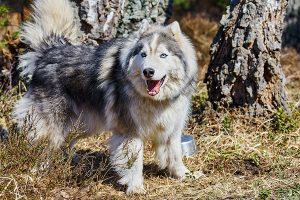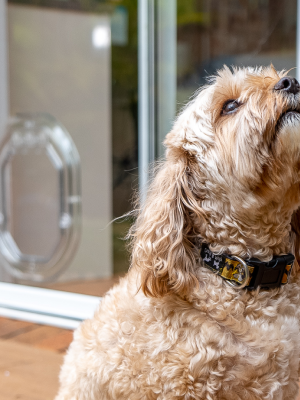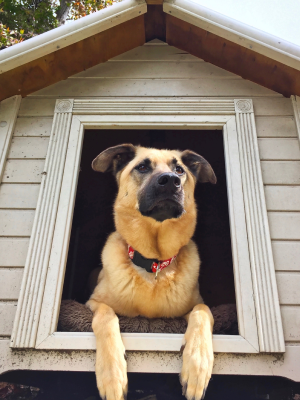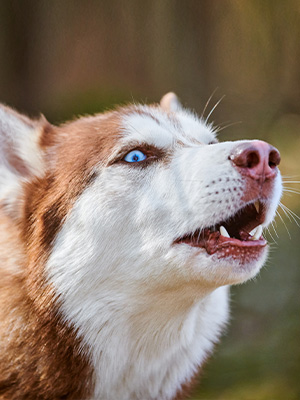
Dogs howl as a form of communication, expressing their emotions and intentions. Whether it’s to seek attention, interact with fellow canines, or merely announce their presence, howling serves as their vocal language. Some dogs even respond to loud, continuous noises like sirens by howling. Excessive howling, however, may indicate your dog is in trouble, so it is important to understand the reason your dog might be howling. We discuss why dogs howl, what they howl at and how you can stop it.
Our Blog
Our Blog
10/4/24
Why Do Dogs Howl?
Dogs howl as a form of communication, expressing their emotions and intentions. Whether it’s to seek attention, interact with fellow canines, or merely announce their presence, howling serves as their vocal language. Some dogs even respond to loud, continuous noises like sirens by howling. Excessive howling, however, may indicate your dog is in trouble, so it is important to understand the reason your dog might be howling. We discuss why dogs howl, what they howl at and how you can stop it.
What is Howling?
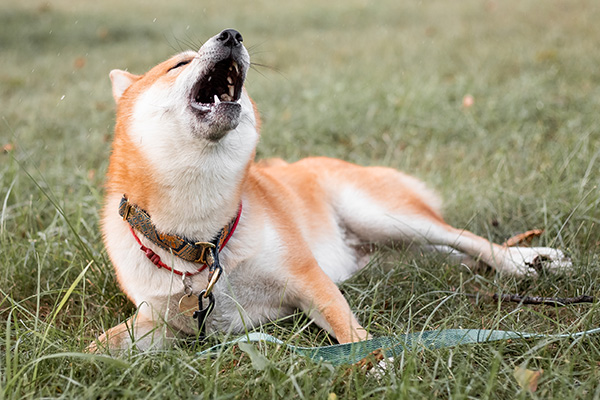
Howling is a vocalisation that dogs do which sounds like a long, drawn out cry. It is different from a bark which is usually short and abrupt. A howl sounds more like a singer holding a long note. Howling links back to ancestral roots when wolves howled to mark their territory or communicate with the pack. These days, dogs are less likely to howl to mark their territory, but it is used as a form of communication.
Why Do Dogs Howl?
Dogs use different verbal and body language cues to communicate with us, and howling is one of them. Much like barking or growling, a dog howls to tell you how it is feeling. A dog may howl to seek attention or communicate with other dogs. But howling can also be triggered by a serious issue. We examine the reasons a dog might howl, from underlying problems to natural communication tactics.
Underlying problems
If your dog is howling it is always wise to rule out any problems, as excessive howling may be a sign it is suffering. Negative reasons a dog may be howling include:
- Separation anxiety. When dogs are suffering from separation anxiety they become nervous and anxious, which can result in destructive behaviours like howling. Dogs can become visibly upset because they are separated from their guardians, owners, or the people they are dependent on. They often begin to display anxiety by becoming vocal or destructive, as soon as their owners prepare to leave. It is important to identify if your dog is suffering from separation anxiety, so you can start to alleviate the problem. Simple techniques used to help with separation anxiety include behaviour modification, positive reinforcement, the use of pet doors, medications and natural therapies.
- Pain or illness. Sometimes howling can be an indication that your dog is trying to communicate pain or illness. Dogs cannot tell us how they feel, but they do indicate through verbal or physical signs, so it is important to pay attention. Illnesses that can cause a dog pain include toothache, arthritis, and ear infections. Your dog may also feel pain because of an injury. Contact your vet if your dog is signalling pain or illness.
Other reasons for howling
After ruling out any underlying problems, there are a number of reasons your dog might be howling. These include:
- Wanting your attention. For some dogs, howling is a ploy to get your attention, much like barking. It may need attention because of boredom, lack of exercise, wanting food or a desired object, or because they found something interesting. Whatever the catalyst, consistent howling for attention will quickly become tiresome. It is important to not reward these vocal commands. When the dog howls, try not to make eye contact and don’t go over to it. Don’t talk to your dog but don’t go mad at it either as both are forms of attention. When the dog quietens down, give it the attention it needs.
- Communicating with other dogs. Being descended from wolves, dogs can still howl to communicate with other dogs. Howling was always meant to be heard over a long distance, and a way to make an announcement to other dogs far away. This kind of communication helped members of the pack find each other.
- Alerting to danger. Sometimes howling may be a dog’s way of signalling danger. If someone walks by the house, a dog may howl to warn a potential intruder away.
- Reacting to noises. High pitched sounds and noises, music and even other dogs howling can cause a dog to howl. The howling reaction is a sign that they acknowledge the sound they are hearing and are ready to respond. Usually the howling will stop when the trigger sound stops.
- Territorial acknowledgement. Dogs may howl because they are marking their territory, particularly from other dogs. Historically dogs and wolves marked their territory using the verbal signals of howling.
- Excitement. Dogs can howl to express emotions of sadness or worry but they also howl because of excitement. A dog might be excited after being reunited with their loved ones and start howling. They can also get overly excited when they see another dog and start howling.
Why Do Dogs Howl At Sirens?

Dogs have much better hearing than humans, so it is possible that when a dog hears a siren it is amplified. However, the true reason dogs howl at sirens is not really known. Most experts believe dogs howl at sirens for two reasons – mistaken identity and home defence.
- Mistaken identity. Dogs hear at a higher frequency than we do, so when a dog hears a siren it could be mistaken for another dog howling. Dogs often howl in response to other dogs howling as a form of communication.
- Home defence. Dogs are very protective of their owners and their territory. When a dog hears a siren, it might not recognise what it is, and may be received as a threat. Dogs tend to howl in conjunction with the noise, and stop howling when the noise stops. If it is a siren, a dog might interpret that their howling has made the potential threat go away. It then becomes a pattern over time.
What To Do About Excessive Howling
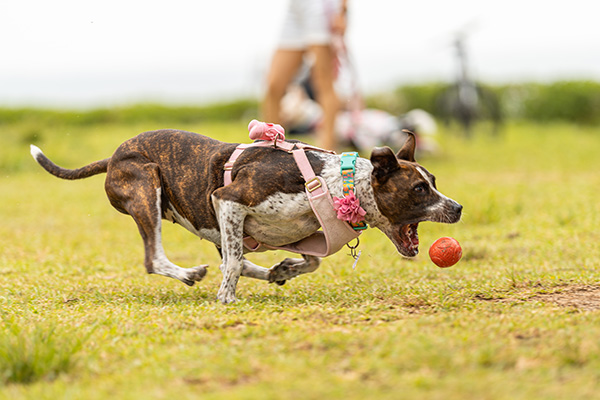
There are times when a dog howls that it is understandable, particularly if there is something wrong that needs to be addressed. However, when a dog’s howling becomes excessive and disturbs the peace, it can be intolerable. Here are a few ways to help manage the problem once you have ruled out underlying problems.
- Exercise. Sometimes dogs howl because they are bored and have excessive energy. Take your dog on a walk at least an hour per day, or make sure they exercise regularly by running after a ball, or playing in the backyard. Swimming can be a great way for dogs to expel extra energy if you have a beach nearby.
- Reward quietness. If your dog is howling to get attention, try not to reward it with attention as this reinforces that the behaviour is acceptable. Instead, turn around so you are not facing the dog and don’t talk to it. Then wait for the dog to be quiet, and reward with pats, words of encouragement, or a special toy. The dog will learn that howling doesn’t work to get what it wants, but being quiet does, and should start to change the behaviour.
- Desensitisation training. This is a popular technique for addressing problematic behaviour like howling. To start desensitising, have your dog in a quiet room and then gradually expose it to the triggering noise. Start softly and then increase slowly until you see signs it is responding. That could be as small as an ear twitch. Leave the noise at that level to get used to it. Play the sound at that level for 5 minutes every three to four days. Once your dog stops responding to that level, increase the sound in increments and repeat the same strategy. The aim is, at the end of desensitisation, your dog will no longer react to the stimuli.
- Use white noise or calm music. Just like humans, white noise and calm music is known to be soothing. Music therapy can relieve stress and anxiety that may cause your dog to howl. Playing calming music can also mask any outside noises that may be a trigger.
- Train your dog to be comfortable when alone. Dogs that do not like being left alone can suffer from separation anxiety, so training your dog to be comfortable during these times is helpful. Build up the alone time gradually, leaving for small periods and then returning so the dog knows you will come back. Leave an item that has your scent with the dog. Provide plenty of stimulation with toys, or a bone to distract it from missing you.
- Invest in a pet door. Pet doors are a wonderful way to help distract dogs when they are left alone and start to feel anxious or bored. They are also an ideal tool for stopping a dog howling because it needs to go outside and relieve itself as it gives easy access to the backyard.
- Take necessary measures if you know your dog is going to be exposed to loud noises like alarms or thunder. If you know there is going to be thunderstorms or external noises that trigger your dog howling, there are preventative measures you can take. Bring your dog inside during a storm or when there are sirens outside. Provide background noise like a television or radio to mask the noise. Distract your dog by playing inside and keeping it entertained until the noise passes.
- Seek professional help. If your dog howls excessively, it may be so severe that you need to enlist professional help. Animal behaviourists, dog trainers and vets are all excellent resources that will be able to help you and your dog, particularly if the cause is medical issues or separation anxiety. Professionals will be able to help diagnose the issue and offer treatment or training to alleviate the problem.
Additional Reasons for a Dog Howling
Apart from medical causes or natural communication tactics, additional reasons for a dog howling can be related to breed and age.
Breed
While howling is common in all dogs, there are some breeds that are more disposed to it than others. Dog breeds may be more likely to howl if they are genetically more similar to wolves. Others may be predisposed due to line breeding. Breeds most likely to howl include:
- Beagles.

Bred originally as hunting dogs, beagles howled to alert companions of the presence of prey. These days, beagles are sometimes used for hunting, but mostly as loveable pets. Their line breeding may still cause an inclination to howl today as they like to express themselves verbally. - Siberian Husky.

Siberian huskies have a propensity for howling and vocalisation that dates back to their ancestry of pack living. For these huskies, howling was a way to communicate with the pack to demonstrate potential danger, location, or response to noises. These days, Siberian huskies are known to respond to high pitched sounds like music with long and melodious howling. - Alaskan Malamute.

A cousin of the Husky, the Alaskan Malamute also has a reputation for howling as a form of communication. This breed was bred as sled dogs and to haul heavy weight across long distances. Their howling is a long, high-pitched sound that can be heard from a distance. These days, they are known to be a vocal dog, expressing emotions or reactions through howling. - Basset Hound.

Originating in France, the Basset Hound was bred as a hunting dog to track game. They are known to be extremely vocal and howl a lot more than other breeds. They were bred to bark or howl loud enough to be heard significant distances away, to signify the location of prey. These days, Basset Hounds still have the propensity for expressing their emotions and reactions through sound. - Dachshund.

Although they are small, Dachshunds have a large howl that can be quite a surprise considering their size. Bred originally to hunt badgers, Dachshunds used their vocal skills to alert hunters of the badger’s location under the ground in their den. These days, they still tend to howl when triggered by noises or wanting to communicate.
Age
Howling seems to be more prevalent in dogs at both ends of the age spectrum. Puppies generally go through a stage of howling and usually grow out of the behaviour. If not, you can train a puppy out of howling using the same tactics as an adult dog, although puppy training does require more patience.
At the other end of the spectrum, senior dogs may also howl more as they get older. This is true of dogs that have become confused, who have dementia, or have a loss of hearing or sight.
Howling is a natural behaviour for dogs because of ancestral and breeding ties. When a dog howls it is simply another way to communicate. However, when a dog howls too much, it can become a problem. It may be a sign that something is seriously wrong, or could just be a learnt problematic behaviour. If your dog’s howling is causing problems or you are concerned about their health and wellbeing, it is always wise to investigate further. Our guide explains the reasons dogs howl, and how to stop it.
Latest Posts
Latest Posts
Questions? We’re here to help.



